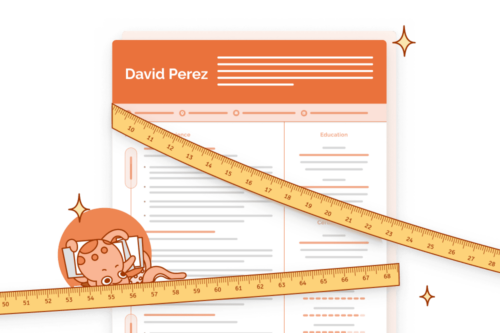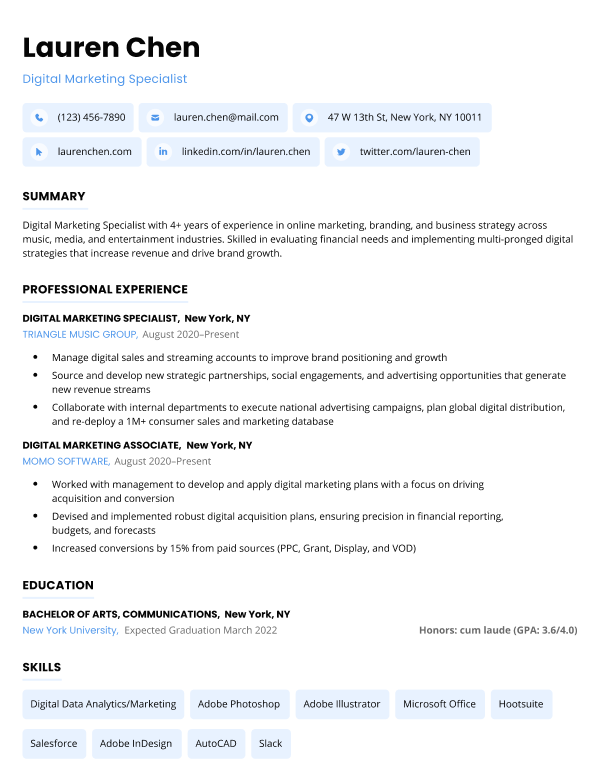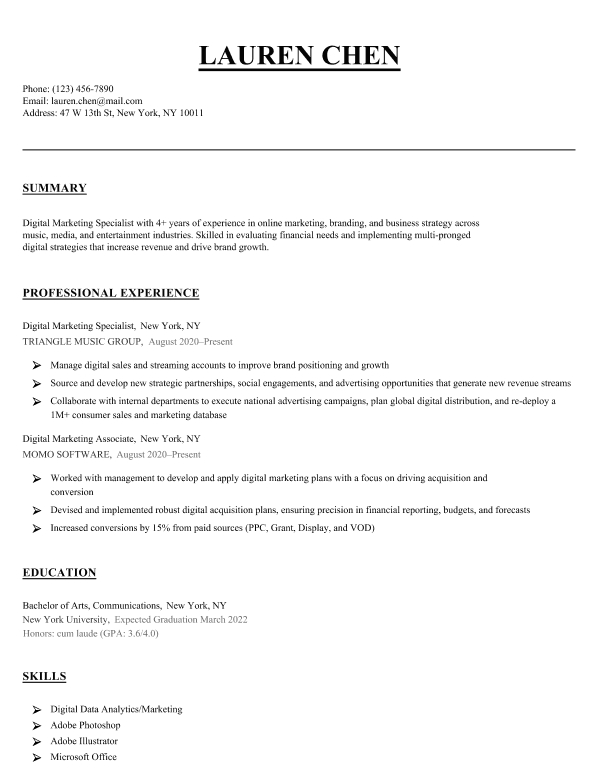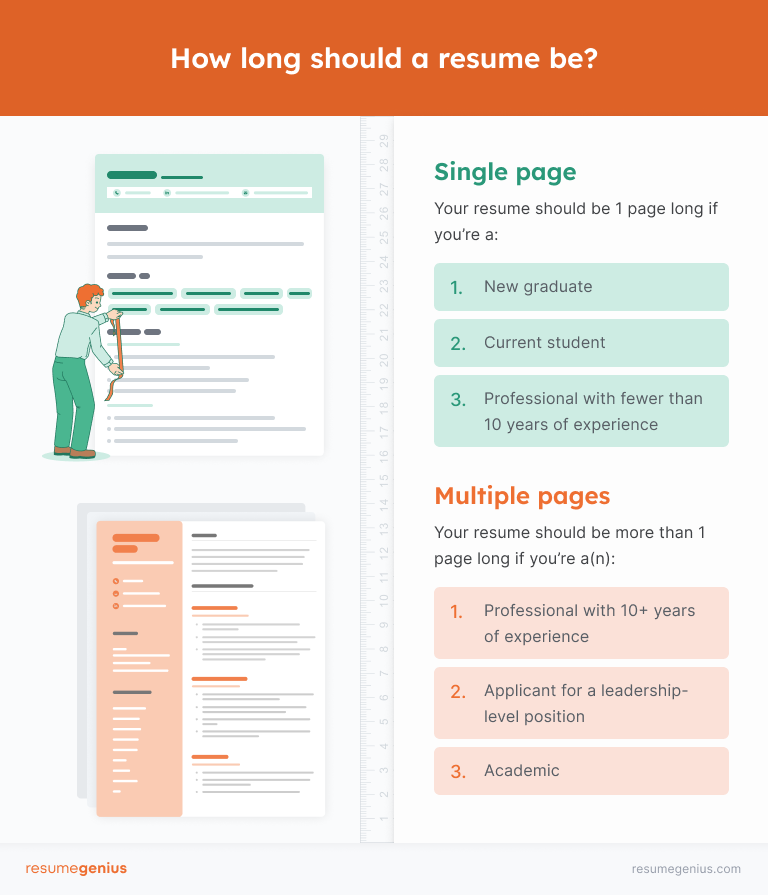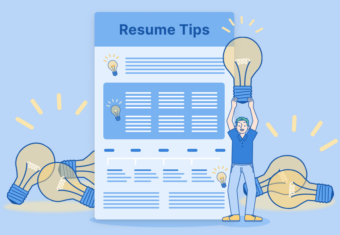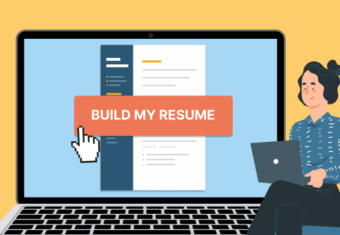A resume should be one page for most applicants, especially for students and anyone with fewer than 10 years of relevant work experience.
Our free-to-use resume builder can make you a resume in as little as 5 minutes. Just pick the template you want, and our software will format everything for you.
Hiring managers are busy people, and a one-page resume gives you enough space to communicate your professional experience and skills without going into excessive detail.
However, if you have more than 10 years of experience in your industry, you can make a two-page resume to elaborate on that experience and showcase all of your job skills and qualifications.
When it comes to the length of your resume, what’s most important is that all the information you include is relevant and concise.
A two to three-page resume is only a problem when it’s full of irrelevant information or old jobs that no longer represent your current skill set.
Resume Genius’s in-house resume expert, Eva Chan, sums up why a one-page resume is the ideal length for most entry-level job seekers in this video:
Standard resume length by experience level
Here are the answers to how long your resume should be, based on your experience level:
How long should your resume be at the beginning of your career?
When you start your career, stick to a one-page resume. As an entry-level or early-career candidate, you don’t have enough experience yet to warrant a second page. If you find yourself with a second page, chances are there’s excess fluff or irrelevant information to cut.
How long should a mid-career resume be?
If you’re a mid-career professional, use a one or two-page resume, depending on how much experience you have that’s directly relevant to the job you’re applying to.
In general, leave experience from 10+ years ago off your resume – you want to show off your recent relevant experience.
Try to keep your resume brief, but don’t omit anything that will show hiring managers you have the skills and experience they’re looking for.
In Resume Genius’s 2024 Hiring Trends Survey, 54% of hiring managers say they prefer 2-page resumes, no matter the company size.
How long should a resume be for 20 years of experience?
As an experienced professional, your resume should be a comfortable two pages, or even three if you work in a field that requires a more comprehensive document.
However, try to keep your resume as concise and relevant as possible. While there’s not necessarily any harm in submitting a resume that’s 3+ pages long, there’s a good chance it won’t even be read beyond the first page or two.
To keep your resume snappy, omit any experience from 10–15+ years ago and tailor it to your target position by including only experience that’s directly applicable.
4 tips for achieving the perfect resume length
So now you know how long your resume should be. But condensing all your experience and skills onto one or two pages is tough.
Don’t worry — anyone can hit the ideal resume length with these four tips (really, anyone: even Elon Musk’s resume can be trimmed to one page):
1. Tailor your resume to each application
The best way to ensure you achieve the proper resume length when writing your resume is to tailor the information you include to the position you want.
Every job you apply for has different requirements and qualifications. Whenever you apply for a new job, your resume (and cover letter) should change to reflect these requirements.
For example, if you’re writing a marketing resume, including information about your experience waiting tables is irrelevant and should be left off.
To tailor your resume, start by looking at the job description, and remove anything that isn’t directly mentioned in the listing. In particular, look out for the specific skills they’re looking for, and how many years of experience they want.
Additionally, remove any positions that you held a long time ago. If you’re unsure how far back your resume should go, just omit anything over 10–15 years old.
Shaving down your resume to only the most relevant information not only helps you fit it on one page, it also makes you look perfectly suited for the position.
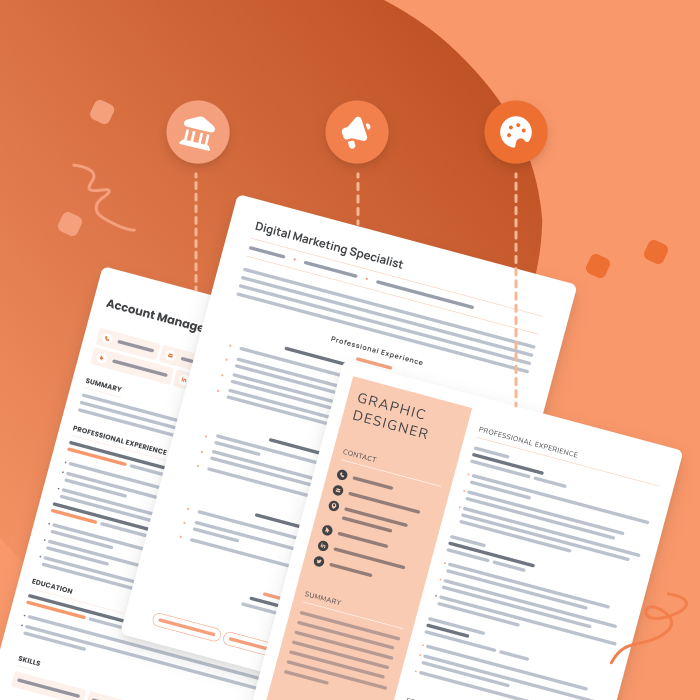
Resume examples for different industries
Not sure what your resume should look like? The best way to learn is by taking inspiration from resume examples written by other candidates in your industry.
2. Be selective about which roles you include
Many job seekers mistakenly assume that their resume should list all the jobs they’ve held in their lives. However, this is only the case if you’re writing a master resume or an academic CV.
If you’re resume’s getting long, consider cutting any experience that isn’t relevant to the job you’re applying for. Remember, if your resume seems long to you, it’s more than likely too long for the hiring manager.
You can remove specific roles from your resume, or, if you don’t want to leave any glaring gaps, remove any bullet points that don’t specifically address the job requirements.
3. Use 3–5 bullet points for each role
Recruiters don’t want to read about every detail of your work history when reviewing your application. To ensure you highlight the information they do want to read, the professional experience section of your resume should be concise but informative.
Rather than try to cover everything you did at your previous jobs, narrow your achievements down to three to five bullet points, highlighting only the most impressive details.
Additionally, if you have an older position on your resume or one in which you were an entry-level employee, provide just two to three bullet points. This way, you have more space to elaborate on your most current experience.
Then, go through your resume several times and see if you can simplify the language. Remove filler adverbs (like “very” and “extremely”) to shorten sentences and make everything easier to read.
Also, avoid starting your bullet points with lengthy and passive phrases like “Responsible for…” Instead, use concise action words that get right to the point.
4. Adjust your formatting
Have you fine-tuned the language in your resume but still can’t fill every page? Try adjusting your resume’s format.
First, try making your resume margins smaller to fit more words on the page. Then, make your resume font smaller. Just don’t go under 10 pt font, otherwise it risks becoming hard to read.
You can also try to shrink your resume header or remove unnecessary graphics to free up more space.
And if you still can’t fit everything on one page, try using tables to organize the smaller parts of your resume. For example, many job seekers format their skills section like this:
SKILLS
- CSS
- HTML
- WordPress
- Content strategy
- SEO writing/editing
- Client management
- Online fundraising
- Social media
Instead, use a table (and with the borders removed) to format your skills section like this:
SKILLS
- CSS
- HTML
- WordPress
- Content strategy
- SEO writing/editing
- Client management
- Online fundraising
- Social media
Using tables helps you format your resume efficiently, and gives you more space to include valuable information.
Frequently asked questions about how many pages a resume should be
Still have some questions about the length of your resume? Here are answers to some of the most frequently asked questions about how long your resume should be:
Is a 2-page resume ok?
A two-page resume is fine for mid-career or experienced professionals. Just make sure you keep it concise and relevant.
Is a 3-page resume too long?
A three-page resume is fine if you have enough relevant experience, but don’t make it three pages long unless every piece of information applies to the job you’re applying for.
When you’re submitting a three-page resume, it’s important to recognize it may not all be read – keep your most essential experience and qualifications on the first (or second) page.
Does your resume have to be one page?
No, your resume doesn’t have to be 1 page. Your resume can be 2 pages or longer if:
- You have 10+ years of experience
- You’re applying for a senior management position
- You’re writing a resume for a federal government job
If you’re applying for an academic or scientific research position or writing an academic CV, the rules about resume length don’t apply. The standard CV format provides unlimited space to list your research, publications, and achievements.
Just remember to submit at least a 1-page resume. The lack of information on a resume that’s less than 1 page will make you appear inexperienced. Instead, when you write a resume with no experience, fill empty space with extracurricular activities, volunteer work, or hobbies to showcase your relevant skills.
How specific should a resume be?
A resume should be as specific as possible to demonstrate that your experience aligns with your target role. When you write your resume, only list information related to the job you’re applying for to keep your application short and easy to read.
To write a specific resume:
- include keywords from the job ad
- research the company to learn which of your hard and soft skills, achievements, and work experience are most relevant
- place your most impressive job-specific qualifications in the resume summary at the top of your resume
- put the job title you’re targeting in your resume’s filename
Even if you’re writing a general resume to post on a job site, your resume should be concise and specific to the type of work you’re seeking.
How long should a CV be?
There’s no limit to how long a CV can be. Academics are expected to list every publication and academic achievement, so the standard academic CV format is quite flexible in terms of length.
Click to rate this article
4.8 Average rating


